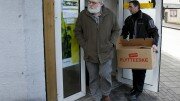319 infected in the worst Ebola outbreak in Congo
The Congolese Health Department has registered 319 confirmed and likely cases of Ebola after an epidemic erupted this summer.
The Ebola outbreak is the worst ever to hit the Central African country.
The virus has so far killed approximately 198 people. Work on stopping the virus has been made more difficult by armed groups fighting for control in the east of the country, where the eruption started. Local reluctance has also hindered the health worker’s progress.
However, the authorities have so far vaccinated over 27,000 people against the virus, which infects through contact with body fluid from an infected person.
Norway and Ebola
Norway provided more money to crisis management after a Norwegian woman was infected by Ebola. But that did not necessarily lead to better help, according to a masters’ thesis, reports forskning.no
The Ebola epidemic in 2014-2015 took more than 11,000 human lives, 99.9 per cent of these in three West African countries: Guinea, Liberia and Sierra Leone.
A specific event played a major role in Norway’s handling of the crisis: A Norwegian health worker was infected by the virus.
In the media, pictures of the Norwegian woman’s journey home to Norway and the reception at the Ullevål Hospital in Oslo were abundant. As a result of the great attention of the media and the Norwegian public, Norwegian authorities contributed four-fold to the Ebola crisis in just one week, from NOK 80 million before the woman was infected to 330 million after she returned to Norway.
Antoine de Bengy Puyvallée completed his masters’ thesis about the Ebola crisis last year. He claims that there is a clear connection between the infected woman and how the Norwegian authorities related to the crisis.
– The Government’s response was both an answer to the public’s requirement that something must be done about the ongoing tragedy in West Africa and attempt to stop the spread of the epidemic – and thus protect Norway, says Puyvallée.
This is also the conclusion by the Norwegian Directorate of Health in their report on the Ebola crisis (pdf).
Focus on security made the response cumbersome
The student claims in his Masters’ thesis that the focus on safety led to the Norwegian Authorities mobilising more resources with greater flexibility. He emphasises that this made the response cumbersome, costly and ineffective. Norway’s biggest financial contribution was to set up a field hospital in Moyamba, Sierra Leone, with a price tag of NOK 110 million.
– Health workers were not allowed to go outside the hospital or the base. Both places were fenced off and protected by armed guards. This clearly influenced the authorities’ ability to reach people in the more remote areas.
The 100-bed field hospital admitted only 33 patients over a period of three and a half months, whereof 18 died.
– One of the reasons for these disappointing figures is that the epidemic became less extensive than was expected. Nevertheless, the safety requirements for health personnel from the Norwegian Authorities led to a cumbersome, less effective and more costly response compared to the contributions of NGOs, he asserts.
Consequences of security focus
Increased use of security arguments in humanitarian operations raises ethical questions.
– Can this focus lead to a shift in the development agenda to matters that have a potential impact on the threat, but less focus on the most vulnerable? Puyvallée queries.
– The security perspective described by Puyvallée is becoming increasingly applicable globally. Not only in health – but in all humanitarian work, Associate Professor and Director at the Center for Development and Environment at UiO, Sidsel Roalkvam informs.
– This raises some important ethical and political issues that it is important to be aware of and to decide on, she continues.
According to Redd Barna (Save the Children), all the financial contributions that were granted during one year from international players in the fight against the Ebola epidemic could finance three years of universal healthcare in Guinea, Sierra Leone and Liberia. This would improve the health of the inhabitants significantly.
© NTB scanpix / Forskning.no / #Norway Today



